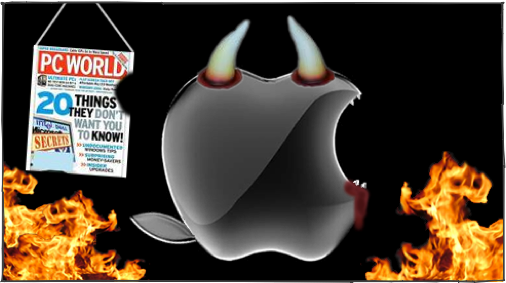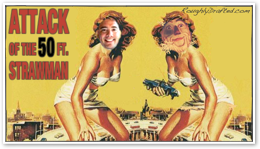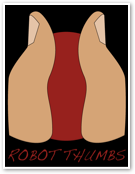


According to proponents of this myth, Steve Jobs dictates to the media what articles may be published about Apple Inc., and which must be censored to prevent incurring the wrath of Apple and a subsequent, vengeful embargo of advertising revenue. They're wrong, here's why.
Why the Myth was Woven.
This myth is part of the "Other Companies are As Bad as Microsoft!" justification meme, which seeks to deny Microsoft's documented decades of wrongdoing by insinuating that everyone else is just as bad anyway.
-
•Microsoft has used its monopoly powers to stifle free competition and destroy markets it chooses to enter over the last 15 years? Well Apple has a monopoly with the iPod because it has sold a lot in the past three years, despite larger and more entrenched companies offering an array of competing products, including Microsoft!
-
•Microsoft's products are plagued with security and architectural problems that cost customers billions of dollars to deal with and have taxed the productivity of users for the last two decades? Well there was a brief, hypothetical exploit of a software product sold by Apple, too!
-
•Microsoft has run a series of fraudulent commercials, documented astroturf programs, and has leveraged its monopoly and political power to defraud customers, organize fraudulent 'grassroots' campaigns, and avoid prosecution for criminal convictions? Well it appears that Apple tells PC World what it can write!
The Myth Weavers.
One of the top campaigners smearing Apple with invented mud is of course Paul Thurrott, who introduced this myth to his readers by citing select bits from an article written by CNET's Tom Kranzit.
While Kranzit's article was surpassingly balanced and informative (particularly for CNET), Thurrott managed to gerrymander a quote that presented half the story: that anonymous sources had said PC World editor Harry McCracken quit his job after senior VP Colin Crawford ‘pressured him to avoid stories were critical of advertisers.’
Since the story in question was “10 Things We Hate About Apple,” poking fun at Steve Jobs, Thurrott ignored the truth to create his own version of what happened. It wasn't just that Crawford and McCracken had an editorial dispute, but that Apple was suddenly censoring PC World.
“It's insane desire to constantly control the messaging [sic] raises its ugly head so often these days (witness: Suing blogs, trying to prevent publication of iCon, and so on) that the company just seems diabolical.”
Yes, Thurrott says Apple is the Devil because Steve Jobs wasn't interested in selling an unflattering biography about him in Apple's retail stores, because the company sued to find out which of its employees were breaking their NDAs, and because the company controls the media by withholding advertising money. Right.
Unraveled with Extreme Prejudice.
Does Apple really control the media? If so, why has every major media outlet ran lies and misinformation from Greenpeace for months? Apple's only action was to present a notice from Jobs--which really only contained information the company had already presented earlier--in efforts to clear the air. No embargoes, no retribution.
And what about all the misinformation about online music sales and iTunes DRM? Jobs merely posted a letter explaining the company's stance, which correlated with what Jobs had stated years earlier when iTunes was first getting started. Apple followed up with announcements of a progress on the issue with EMI. No embargoes, no retribution.
If Apple were diabolical for censoring the media by withholding its advertising budget, that's certainly news to everyone who sees Apple ads everywhere, right next to the FUD and misinformation that the media has disgorged incessantly over the last decade. Exactly what control is Apple exercising with its ad budget?
Et tu, Mac Mags?
Apple has always had ads in major Mac magazines, despite the fact that those magazines had a history of regularly publishing embittered anti-Mac propaganda. The now defunct MacUser was a prime example. It should have been titled MacAbuser.
Macworld, which absorbed MacUser, toned things down a bit, but only because the magazine itself is toned down to the point of being a meaningless bit of milquetoast that exists only out of tradition.
I don't know what planet Thurrott has been living on, but I have certainly found it curious that Mac-centric magazines have consistently sought to published as much Mac bashing garbage from columnists such as John Dvorak, Ian Betteridge, and others as seemingly possible over the last decade.
Critique Vs Cranky.
I can't recall seeing even the most timid criticism of Microsoft in the pages of PC World or other Windows-centric magazines. Do Windows Mobile mags ever point out the absolute failure of Microsoft's mobile platform? Do Xbox mags rag on Microsoft for issuing fake sales numbers and stuffing the channel? Do women's magazines publish regular misogynic opinions?
Why the vapid disconnect? Why have Mac magazines long been absolutely hostile of Apple and the Mac platform? What service has this provided Mac users? Criticism is healthy and useful, but please, Dvorak? He's done little but vent snide and uninformed complaints that offered nothing but flames and trolling over the last decade.
There are very few paid Mac writers who actually support the Mac platform, apart from Enterprise Mac writer Tom Yager; his gushing is often even embarrassing to me. Even so, he is also known for starting an uninformed flame accusing Apple of undermining society with its brutal open source policies, which then turned out to be rubbish.
Why do mainstream Mac magazines hate the Mac? And that being the case, how can Thurrott disgorge his inane line of specious trash about Apple being the Devil by controlling what the media prints?
The answer of course, is that he worked long and hard to invent a way to rope Apple into the non-issue, and once having discovered his slant, ramped the fabrication into a high pitched screed of contrived emotionalism and feigned outrage.
The Real Story.
Thurrott carefully failed to mention that the CNET article he quoted from went on to state, in the next line, “Crawford denied [in an email] that advertiser pressure played any part in McCracken's resignation.”
John Gruber of the Daring Fireball took apart the more inane bits of the dramatic episode and concluded, “It boils down to this: Did Crawford kill a fair and truthful article because it was unflattering to Apple? Or did he kill it because he thought the article wasn’t good?”
The answer was provided by Wired writer Kim Zetter, who worked under McCracken and reported the comments of an individual actually at the meeting where Crawford and McCracked came to a disagreement. That person noted that the article in question was only a rough draft, and was intended to be part of a series.
The first article, "10 Things We Hate About Apple," was intended to be followed by “10 Things We Love About Apple,” with matching love and hate articles about Microsoft. Meaty and incisive journalism censored by Apple?
The source actually described them as fluff, saying they “were produced for the web site only. We're under a lot of pressure to attract more traffic, and these list stories can be blockbusters. We do view them as an opportunity to be less serious--fluff is as good a word as any--but why that should be such a problem is beyond me.”
The Mindboggling Misinformation Engine of Thurrott.
So rather than a diabolical plot by Apple to use its ad revenue as a weapon to undermine free speech, the real situation was an internal editorial power struggle over a sensationalist fluff piece of made-for-Digg junk content, which Crawford thought was objectionable as emotive, pandering trash.
McCracken felt that Crawford's veto of the fluff series infringed upon his role as editor in chief of the magazine, and left to pursue other things. No doubt it was not the first time that this clash had happened, but became the tipping point in a situation that had been brewing.
In any event, characterizing the squabble as something related to the Evil of Apple is really the most absurd stance possible, and fits Thurrott like a glove.
Scorecard:
- Fail
IDG: still coming up with pandering fluff to enflame web traffic stats rather than inform its readers.
Paul Thurrott: still ramping up absurd, rabidly emotional hatred of Apple for imagined crimes. Jackass.
= Pass
Steve Jobs: clearly doesn't worry too much about the content published by struggling fluff magazines.
Apple: uninvolved in the fray apart from being maligned by Thurrott and other desperate sensationalists.
+ Advance
John Gruber: props for calling out jackassery, but dinged for giving Thurrott regular, undeserved credit out of misplaced professional courtesy and overreaching efforts to appear balanced.
Tom Kranzit: temporarily redeemed CNET for publishing an even handed article on the subject.
Harry McCracken: props for leaving his cushy job on personal principle, a ding for those principles being limp.
Colin Crawford: props for vetoing the disgorgement of more weak fluff on the web.
Kim Zetter: props for revisiting an initial article to set the record straight with new information.
Like reading RoughlyDrafted? Share articles with your friends, link from your blog, and subscribe to my podcast!
Next Articles:
This Series

Haloscan Q107
Harry McCracken and the Apple Censorship Myth
Saturday, May 5, 2007

Ad







 Bookmark on Del.icio.us
Bookmark on Del.icio.us Discuss on Reddit
Discuss on Reddit Critically review on NewsTrust
Critically review on NewsTrust Forward to Friends
Forward to Friends
 Get RSS Feed
Get RSS Feed Download RSS Widget
Download RSS Widget





